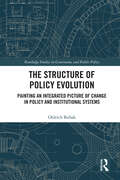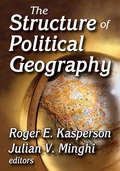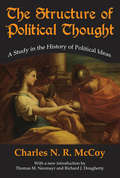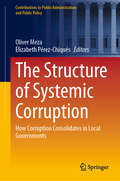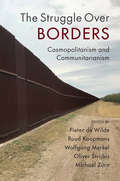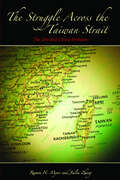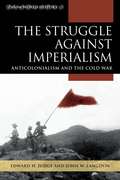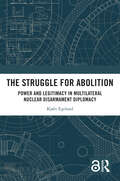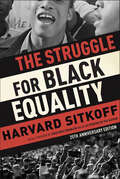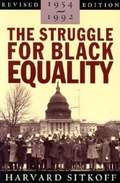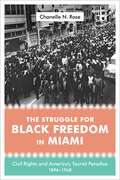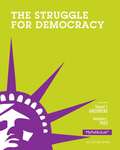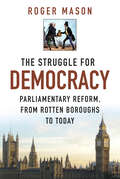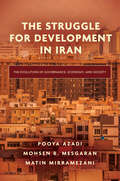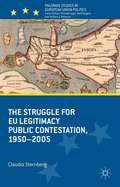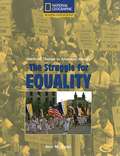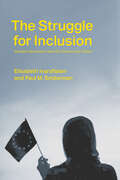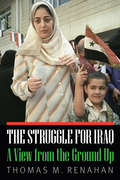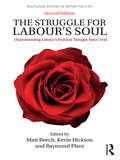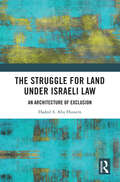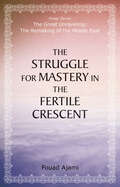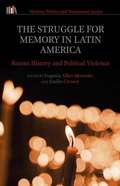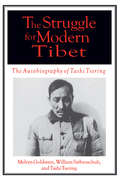- Table View
- List View
The Structure of Policy Evolution: Painting an Integrated Picture of Change in Policy and Institutional Systems (Routledge Studies in Governance and Public Policy)
by Oldrich BubakThis book advances novel tools for the study, analysis, and development of public policy, essential in a world of growing diversity, complexity, and accelerating change. Inspired by research in technology innovation, the book brings its forward applications into the studies of policy and institutional systems, answering, among others, the disciplinary need for a common model of change. Relating together the dynamics and the structure of policy evolution, the unified approach offers scholars important new insights into the logics and direction of policy development while advancing policy practitioners’ capacity for forecasting and optimizing designs. Analyzing social and labour market policy development across two model jurisdictions, the United Kingdom and Denmark, it substantiates the new approach while demonstrating its significance to the study of welfare modernization and to policy scholarship more generally. The book will be of key interest to scholars and students of policy and institutional development, policy analysis, and public administration and management, as well as comparative policy, evolutionary and complexity policy, and social policy and welfare state modernization research.
The Structure of Political Geography
by Julian V. Minghi Roger E. KaspersonThis volume seeks to provide a sense of purpose and order to the study of political geography. The editors devise a conceptual structure for the field, bringing political geography into line with trends in contemporary geography as a whole and with other social sciences. Not only do the selections contain a wide variety of contributions from other fields, but the introductory essays and annotated bibliographies suggest related research. The structure of the book enjoys close parallels in other social sciences.The organization of the book reflects the editors' definitions and structuring of political geography. Part I, ""Heritage,"" includes works that have contributed to the theoretical development of the field. Part II, ""Structure,"" comprises the concern to which political geographers have devoted most of their past attention. Parts III and IV, ""Process"" and ""Behavior,"" form the subject where much future theoretical and practical effort is needed. Part V, ""Environment,"" provides the context in which spatial structure, process, and behavior occur.The Structure of Political Geography includes selections from sociobiology, history, international relations, political economy, political science, social psychology, and sociology. The classics in the field are an essential inclusion since the book would be incomplete without them. The selections in the volume, originally published in 1971, remain useful and pertinent to political geographers of diverse persuasion and to social scientists interested in geographical approaches. The fact that there is a clear focus and conceptual interdependence in political geography is the volume's greatest contribution.
The Structure of Political Thought: A Study in the History of Political Ideas (The\library Of Conservative Thought Ser.)
by Charles McCoyOriginally published in 1963, this classic book is a rethinking of the history of Western political philosophy. Charles N. R. McCoy contrasts classical-medieval principles against the "hypotheses" at the root of modern liberalism and modern conservativism.In Part I, "The Classical Christian Tradition from Plato to Aquinas," the author lays the foundation for a philosophical "structure" capable of producing "constitutional liberty." Part II, "The Modern Theory of Politics from Machiavelli to Marx," attempts to show, beginning with Machiavelli, the reversal and destruction of the pre-modern "structure" postulated in Part I.McCoy stresses the great contributions of Aristotle to political thought found in his more familiar Ethics and Politics, but also includes key insights drawn from Metaphysics and Physics. These contributions are developed and perfected, McCoy argues, by Augustine and Aquinas. Two other important features include McCoy's epistemological insights into Plato's work that will be new to many readers and the author's juxtaposition of traditional natural law with "the modernized theory of natural law." The modern account of autonomous natural law, in McCoy's view, helps explain the totalitarian direction of key aspects of modern political thought. This classic volume on the origins of modern philosophical thought remains a standard in the field.
The Structure of Systemic Corruption: How Corruption Consolidates in Local Governments (Contributions to Public Administration and Public Policy)
by Oliver Meza Elizabeth Pérez-ChiquésThis book presents a series of interconnected studies designed to understand systemic corruption in local governments. Coined as the Corruption Consolidation Framework (CCF), this novel approach elucidates how corruption becomes the rule in formal institutional settings and further consolidates. The CCF analyzes the problem along four dimensions, offering a unique contribution to make sense of a complex problem without oversimplifying the subject. Chapters in the book explore the CCF in case studies conducted across Latin American municipalities in Mexico, Brazil, Chile, and Puerto Rico, however, authors believe the CCF is applicable around the world both in the Global South and in Western countries. The volume is a promising tool for the academic community in the public administration, policy studies, and local government fields. It can also be used in undergraduate and graduate courses on corruption, governance, local governments, and Latin American studies. Finally, it offers a general roadmap to citizens and policymakers about what can be done in cases where corruption has become the rule of the game in local governments. Since the famous book of Klitgaard Corrupt Cities, the world has been waiting for a follow-up on municipal corruption. This collection of LA studies crosses the borders of the continent and makes indispensable reading for students of corruption and local government everywhere -- Alina Mungiu-Pippidi, Professor at LUISS Guido Carli. Author of "The Quest for Good Governance. How Societies Build Control of Corruption" The book fills this gap and takes the reader on an enlightening journey into the world of systemic corruption in municipalities through a collection of well-written chapters with a concept that unifies these cases in a theoretically grounded yet highly applicable framework. -- David Jancsics, Professor at San Diego State University. Author of "Sociology of Corruption: Patterns of Illegal Association in Hungary" Theoretically rich and empirically rigorous, this volume provides a fresh, grounded perspective on the governments residents most often engage. It is a must-read for scholars and practitioners alike. -- Patricia Strach, Professor at Albany, State University of New York. Author of The Politics of Trash: How Governments Used Corruption to Clean Cities, 1890-1929 The framework of corruption consolidation helps explain appropriately how this phenomenon can become the status quo of governance in institutionally weak public administrations. It is a must-read to analyze and understand corruption in the global South. -- Pablo Sanabria-Pulido at Florida Atlantic University.
The Struggle For Democracy
by Edward Greenberg Benjamin PageThe Struggle for Democracy offers students the tools they need to critically analyze our political system and make judgments about how well our government works. Taking a fresh approach to common American government topics, authors Edward Greenberg and Benjamin Page provide an analytical framework for understanding how politics and government work, and encourage students to consider the questions “How democratic are we?” and “Can government do anything well?” In order to boost student engagement with key concepts, the 2016 Elections and Updates Edition incorporates coverage of contemporary issues that dominate today’s headlines, as well as the most up-to-date data.
The Struggle Over Borders: Cosmopolitanism and Communitarianism
by Ruud Koopmans Wolfgang Merkel Michael Zürn Oliver Strijbis Pieter De WildeCitizens, parties, and movements are increasingly contesting issues connected to globalization, such as whether to welcome immigrants, promote free trade, and support international integration. The resulting political fault line, precipitated by a deepening rift between elites and mass publics, has created space for the rise of populism. Responding to these issues and debates, this book presents a comprehensive and up-to-date analysis of how economic, cultural and political globalization have transformed democratic politics. This study offers a fresh perspective on the rise of populism based on analyses of public and elite opinion and party politics, as well as mass media debates on climate change, human rights, migration, regional integration, and trade in the USA, Germany, Poland, Turkey, and Mexico. Furthermore, it considers similar conflicts taking place within the European Union and the United Nations. Appealing to political scientists, sociologists and international relations scholars, this book is also an accessible introduction to these debates for undergraduate and masters students.
The Struggle across the Taiwan Strait: The Divided China Problem
by Ramon H. Myers Jialin ZhangA concise and informative history of how China divided in 1949 into two regimes, why they struggled to achieve the same political goal-reunification of China—and why their struggle today continues in a more complex and dangerous way. The authors detail how the changes brought about by the 2000 election not only intensified the conflict between the regimes but locked both sides into a new contest that increased the probability of war rather than peace.
The Struggle against Imperialism: Anticolonialism and the Cold War (Exploring World History)
by Edward Judge John LangdonThis concise and engaging text argues that the Cold War and anti-colonial movements should properly be studied and taught together, not as distinct developments, but rather as interwoven aspects of a complex global transformation. The authors provide a cogent and concise description of the post–World War II era and reveal connective dimensions of that era that remain hidden in books that focus primarily on either the Cold War or the struggles against imperial rule. It not only deals with anti-colonialism and Cold War together but also portrays the Cold War as a contest between “anti-imperialist empires,” capped by the collapse of one of them—the multicultural trans-regional Soviet realm—in a work that is engaging and accessible to both students and general readers.
The Struggle for Abolition: Power and Legitimacy in Multilateral Nuclear Disarmament Diplomacy
by Kjølv EgelandCan the genie be returned to the bottle? This book investigates the pursuit by states, civil society groups, and international organisations of nuclear abolition. Detailing the evolution of the institutional architecture for multilateral nuclear disarmament from the 1960s onwards, this book tells a story of high hopes, broken promises, and clashing views of history, security, and the future.Global nuclear politics deals in material power and security but is also shot through with contests over prestige, justice, and mutual recognition. Waves of innovation in multilateral nuclear disarmament diplomacy have typically come about on the back of crises of legitimacy within the broader nuclear order.The book concludes with a discussion of policy implications and a reflection on successes and failures in the history of multilateral nuclear disarmament. The volume will be of great interest to scholars and researchers of diplomacy, history, and politics and international relations.
The Struggle for Black Equality
by Harvard SitkoffThe Struggle for Black Equality is a dramatic, memorable history of the civil rights movement. Harvard Sitkoff offers both a brilliant interpretation of the personalities and dynamics of civil rights organizations and a compelling analysis of the continuing problems plaguing many African Americans. With a new foreword and afterword, and an up-to-date bibliography, this anniversary edition highlights the continuing significance of the movement for black equality and justice.
The Struggle for Black Equality 1954-1992
by Harvard SitkoffThe Struggle for Black Equality is an arresting history of the civil-rights movement--from the path breaking Supreme Court decision of 1954, Brown v. Board of Education of Topeka, Kansas, through the growth of strife and conflict in the 1960s to the major issues of the 1990s. Harvard Sitkoff offers not only a brilliant interpretation of the personalities and dynamics of civil-rights organizations--SNCC, CORE, NAACP, SCLC, and others--but a superb study of the continuing problems plaguing the African-American population: the future that in 1980 seemed to hold much promise for a better way of life has by the early 1990s hardly lived up to expectations. Jim Crow has gone, but, forty years after Brown, poverty, big-city slums, white backlash, politically and socially conservative policies, and prolonged recession have made economic progress for the vast majority of blacks an elusive, perhaps ever more distant goal. All Americans who strove and suffered to make democracy real come vividly to life in these compelling pages.
The Struggle for Black Freedom in Miami: Civil Rights and America's Tourist Paradise, 1896-1968 (Making the Modern South)
by Chanelle Nyree RoseOffering new insights into Florida's position within the cultural legacy of the South, The Struggle for Black Freedom in Miami explores the long fight for civil rights in one of the country's most popular tourist destinations. Chanelle N. Rose examines how the sustained tourism and rapid demographic changes that characterized Miami for much of the twentieth century undermined constructions of blackness and whiteness that remained more firmly entrenched in other parts of the South. The convergence of cultural practices in Miami from the American South and North, the Caribbean, and Latin America created a border community that never fit comfortably within the paradigm of the Deep South experience. As white civic elites scrambled to secure the city's burgeoning reputation as the "Gateway to the Americas," an influx of Spanish-speaking migrants and tourists had a transformative effect on conventional notions of blackness. Business owners and city boosters resisted arbitrary racial distinctions and even permitted dark-skinned Latinos access to public accommodations that were otherwise off limits to nonwhites in the South. At the same time, civil-rights activists waged a fierce battle against the antiblack discrimination and violence that lay beneath the public image of Miami as a place relatively tolerant of racial diversity. In its exploration of regional distinctions, transnational forces, and the effect of both on the civil rights battle, The Struggle for Black Freedom in Miami complicates the black/white binary and offers a new way of understanding the complexity of racial traditions and white supremacy in southern metropolises like Miami.
The Struggle for Democracy
by Edward Greenberg Benjamin PageTextbook on the US government, politics, and democracy.
The Struggle for Democracy (Eleventh Edition, 2012 Election Edition)
by Edward S. Benjamin I.The Struggle for Democracy provides students with an understanding of the American political process and with the tools to critically evaluate that process. This text focuses on the role that democracy has played in the American story and asks students how democracy is–or isn’t–revealed in our politics and government. It encourages students to examine how deeply connected politics and government are with historical, economic, and social influences.
The Struggle for Democracy: Parliamentary Reform, from Rotten Boroughs to Today
by Roger MasonPrior to the 1832 Reform Act the electoral system was rife with corruption and in desperate need of reform. In England and Wales only about 12 per cent of adult men had the vote and the proportion was even less in Scotland and Ireland. Women did not vote at all. A single person controlled a rotten borough that returned two Members of Parliament, and for a number of years one of them was the prime minister. Furthermore, not only did voting take place in public, so landlords could and did evict tenants who voted against their wishes, but voting qualifications also differed from place to place. With the use of many fascinating anecdotes, Roger Mason tells how we got from then to now. All the major reforms are covered: Catholic Emancipation, further Reform Acts, the end of the House of Lords veto and, of course, votes for women. This fascinating history offers a complete insight into the way we have voted from the beginnings of Parliament through to the present day.
The Struggle for Development in Iran: The Evolution of Governance, Economy, and Society
by Pooya Azadi Mohsen B. Mesgaran Matin MirramezaniThis book provides a multidimensional analysis of Iran's struggle for development between 1970 and 2020, focusing on fundamentals, institutions, and socioeconomic trends. The past several decades in Iran have been a period of sluggish and noninclusive economic growth, ill-fated social engineering with an Islamic template, political repression, and extensive environmental degradation. The intellectual discourse surrounding the impediments of growth in Iran has been dominated by an exaggerated notion of the role of ideology, class struggles, imperialism, and historical contingencies, overlooking the profound impacts of institutions and fundamental socioeconomic trends. This book aims to fill this gap using positive economics and data-driven analysis to cover a wide array of topics, such as governance, corruption, macroeconomy, population dynamics, labor, financial systems, energy, water scarcity, and food security. Illustrating clearly the complex interactions among different dimensions of Iran's development, this book will be essential for researchers, policy makers, and journalists.
The Struggle for EU Legitimacy
by Claudia Schrag SternbergThis award-winning book answers some of the big questions on the legitimacy of the European Union. Specifically, it looks at what it would mean for the EU to be considered a legitimate body and where our ideas on this question come from. The Struggle for EU Legitimacy traces the history of constructions and contestations of the EU's legitimacy, in discourses of the European institutions and in public debate. Through an interpretive, non-quantitative textual analysis of an eclectic range of sources, it examines both long-term patterns in EU-official discourses and their reception in member-state public spheres, specifically in the German and French debates on the Maastricht and Constitutional Draft Treaties. The story told portrays the history of legitimating the EU as a continuous contest over the ends and goals of integration, as well as a balancing act--which was inescapable given the nature of the integration project--between 'bringing the people in' and 'keeping them out'. In addition, it was a balancing act between actively politicizing and deliberately de-politicizing the stakes of EU politics.
The Struggle for Equality 1955-1975
by Ann M. RossiFrom 1955 to 1975, African Americans, Latinos, Native Americans, and women battled discrimination and fought for equal rights. Read about each group's victories and the challenges they face today.
The Struggle for Inclusion: Muslim Minorities and the Democratic Ethos
by Paul M. Sniderman Elisabeth IvarsflatenThe politics of inclusion is about more than hate, exclusion, and discrimination. It is a window into the moral character of contemporary liberal democracies. The Struggle for Inclusion introduces a new method to the study of public opinion: to probe, step by step, how far non-Muslim majorities are willing to be inclusive, where they draw the line, and why they draw it there and not elsewhere. Those committed to liberal democratic values and their concerns are the focus, not those advocating exclusion and intolerance. Notwithstanding the turbulence and violence of the last decade over issues of immigration and of Muslims in the West, the results of this study demonstrate that the largest number of citizens in contemporary liberal democracies are more open to inclusion of Muslims than has been recognized. Not less important, the book reveals limits on inclusion that follow from the friction between liberal democratic values. This pioneering work thus brings to light both pathways to progress and polarization traps.
The Struggle for Iraq: A View from the Ground Up
by Thomas M. RenahanThe Struggle for Iraq is a vivid personal account of the Iraqi people’s fight for democracy and justice by an American political scientist. Thomas M. Renahan arrived in southern Iraq just three days before the capture of Saddam Hussein in 2003. Later he worked in Baghdad through the dark days of the country’s sectarian violence and then in Iraqi Kurdistan. One of the few Americans to serve in all three major regions of Iraq, he spearheaded projects to develop democratic institutions, promote democracy and elections, and fight corruption. With inside accounts of two USAID projects and of a Kurdish government ministry, this engrossing and cautionary story highlights efforts to turn Baathist Iraq into a democratic country. Renahan examines the challenges faced by the Iraqi people and international development staff during this turbulent time, revealing both their successes and frustrations. Drawing on his on-the-ground civilian perspective, Renahan recounts how expatriate staff handled the hardships and dangers as well as the elaborate security required to protect them, how Iraqi staff coped with the personal security risks of working for Coalition organizations, and the street-level mayhem and violence, including the assassinations of close Iraqi friends. Although Iraq remains in crisis, it has largely defeated the ISIS terrorists who seized much of the country in 2014. Renahan emphasizes, however, that reconciliation is still the end game in Iraq. In the concluding chapters he explains how the United States can support this process and help resolve the complex problems between the Iraqi government and the independence-minded Kurds, offering hope for the future.
The Struggle for Labour's Soul: Understanding Labour's Political Thought Since 1945
by Matt Beech Raymond Plant Kevin HicksonThe election of the most left-wing Labour Party Leader since 1945, followed by the Party's third consecutive general election defeat and the ongoing cultural divisions around Brexit present an ideal opportunity for a thorough re-evaluation of the state of the Party within its broader ideological and historical context. This second edition of this highly respected book analyses the current developments and places them in their historical setting through a clear three-part framework of Ideological Positions, Struggles and Commentaries. Thoroughly updated and featuring contributions by leading academics and politicians, it continues to represent one of the most ground-breaking and thorough analyses of Labour's political thought in a generation and will be of key interest to scholars, students and observers of British Politics, British History, Party Politics, and the Labour Party.
The Struggle for Land Under Israeli Law: An Architecture of Exclusion
by Hadeel S. Abu HusseinThis book provides a comprehensive examination of land law for Arab Palestinians under Israeli law. Land is one of the core resources of human existence, development and activity. Therefore, it is also a key basis of political power and of social and economic status. Land regimes and planning regulations play a dynamic role in deciding how competing claims over resources will be resolved. According to legal geography, spatial ordering impacts legal regimes; whilst legal rules form social and human space. Through the lenses of international law, colonisation and legal geography, the book examines the land regime in Israel. More specifically, it endeavours to understand the spatial strategies adopted by Israel to organise the entire territorial expanse of the country as Jewish, while also excluding Arab Palestinian citizens of Israel and residents of East Jerusalem from the landscape. The book then details how the systematic nature and processes of marginalisation are mapped out across the civil, political and socio-economic landscape. This monograph will be of interest to international legal theorists, legal geographers, land lawyers and human rights practitioners and students; as well as to international scholars, NGOs and others focusing on the Israeli–Palestinian conflict.
The Struggle for Mastery in the Fertile Crescent (The Great Unraveling: The Remaking of th)
by Fouad AjamiIn this book, Fouad Ajami analyzes the struggle for influence along the Fertile Crescent—the stretch of land that runs from Iran's border with Iraq to the Mediterranean—among three of the regional powers who have stepped into the vacuum left by the West: Iran, Turkey, and Saudi Arabia. He explains that, of the three powers competing for influence, Saudi Arabia and Iran are in it for the long haul. Each of those powers has a sense of mission and constituencies that enable them to stick it out and pay the price for a sphere of influence. Each country's prospects for supremacy is detailed and Ajami asserts that Iran must ultimately be reckoned to be the strongest.
The Struggle for Memory in Latin America
by Eugenia Allier-Montaño Emilio CrenzelThis multi-disciplinary volume analyzes struggles over the memory of past political violence in Argentina, Brazil, Chile, Colombia, the United States, Guatemala, El Salvador, Mexico, Paraguay, Peru, and Uruguay. Each chapter offers a comprehensive history of the political violence that occurred in the second half of the twentieth century, analyzing its links with 1) the international context of the cold war, 2) the particular forms of repression and authoritarianism that prevailed in the domestic setting, 3) the social inequalities that were reinforced, and 4) the political, economic, and cultural transformations that Latin American societies were undergoing at the time. Considering the different paths that Latin American countries have taken in their efforts to confront history, the chapters examine how relevant actors look back on past events and vie with one another to give these events meaning in the public sphere. For each country examined, contributors consider the initiatives of transnational, regional, and national actors, as well as factors including class, gender, ethnicity, and geographic location. Chapters give political- and social-historical perspectives and employ tools from a variety of disciplines, including memory studies, history, political science, sociology, and anthropology.
The Struggle for Modern Tibet: The Autobiography of Tashi Tsering (Mellen Studies In Education Ser. #Vol. 88)
by Melvyn C. Goldstein William R Siebenschuh Tashi TseringThis captivating autobiography by a Tibetan educator and former political prisoner is full of twists and turns. Born in 1929 in a Tibetan village, Tsering developed a strong dislike of his country's theocratic ruling elite. As a 13-year-old member of the Dalai Lama's personal dance troupe, he was frequently whipped or beaten by teachers for minor infractions. A heterosexual, he escaped by becoming a drombo, or homosexual passive partner and sex-toy, for a well-connected monk. After studying at the University of Washington, he returned to Chinese-occupied Tibet in 1964, convinced that Tibet could become a modernized society based on socialist, egalitarian principles only through cooperation with the Chinese. Denounced as a 'counterrevolutionary' during Mao's Cultural Revolution, he was arrested in 1967 and spent six years in prison or doing forced labor in China. Officially exonerated in 1978, Tsering became a professor of English at Tibet University in Lhasa. He now raises funds to build schools in Tibet's villages, emphasizing Tibetan language and culture.
